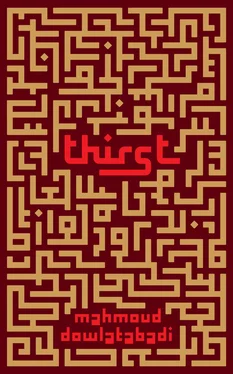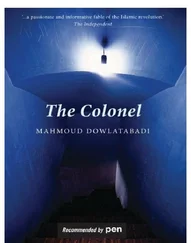‘So you honestly don’t see anything? Not a thing?’
‘Sure … I can see that oaf there, our prisoner. He’s our responsibility now, too. If only I could finish him off. He can’t stand upright either, he fell down over there, and nearly passed out!’
‘Didn’t I order you to give him some water?’
‘I did, though, sir. Otherwise he’d have gone to hell by now. Even so, he can’t stand up, because he’s so overweight!’
‘Give him some more, then.’
‘How much?’
‘Until he’s had his fill! Until he explodes, for all I care!’
‘May I ask, sir …’
‘Ask what?’
‘If you’re alright?’
‘Couldn’t be better! Say what you were going to say.’
‘In such circumstances … I mean, after suffering from thirst for such a long time, if a person drinks too much water, will he explode? Or die suddenly? I’ve certainly seen with my own eyes how men can pass away just like that!’
‘A flask of water can hardly kill a man, can it?’
‘No, sir. But … we don’t have much left either …’
‘It’s not much, I know. The dying, the thirsty … but we’ve been stuck here for too long. Just tell me what we should do with our men. I can’t leave them on this scorching ground under the sun. What should we do with them, soldier? What was your name again?’
‘Anoom, sir. I’ve commandeered a spade from the enemy trench, sir. Allow me to bury them right here, or on the flank of the hill. Close to the water tank. You know how to recite the death prayer, don’t you?’
‘First we must recite our intention. But I’d like us to take them with us. My heart won’t let me abandon them here. In this narrow pass.’
‘We could take them with us, sir, sure. But where to? I don’t have a compass on me. If I’d had one I wouldn’t have been captured. What about you, can you work out which direction we should go in?’
‘I unravelled a ball of string behind us so we could retrace our steps, but heavy bombing has churned up the ground. So we’ll just have to take them to our own trench for now. Now go and get that giant up on his feet, will you? We need him to help us carry his victims. Go and give him something from the flask!’
‘Then what, sir?’
‘I’ll sling a body over my shoulder and climb the hill. You take another and the giant can carry a third. Just make sure you keep your eyes on him.’
‘I’ll lay one body across his neck and shoulders without untying his hands. And I’ll tie his feet together so that he can’t pull any tricks while he’s carrying his burden. Like leg shackles! In just two round trips we can carry them all up to behind our machine gun. It’ll be fine if you just take one body, sir! The two of us, Saad and I, will do the second round. You can go back down to fetch some more water. There aren’t many intact flasks left, but … in the best case scenario the radio telephone might start working again. Then we could call for an ambulance, assuming one can cross the front line.’
‘Cross an area that’s in the enemy hands? Very well, remove his blindfold and take him over to the bodies. Let him see the results of his handiwork at close quarters!’
‘His men were lying about all shot to bits too, sir, as a result of our firing … and our men just went down to that accursed water tank. One by one … I couldn’t stop them. Thirst and the sight of the water tank had made them take leave of their senses, every last one of them! What could I do? They were young. They were volunteers who didn’t really have any understanding of military discipline yet. Instead, they just took the idea of martyrdom for granted. Each person putting the others before himself …’
‘So what preventative actions did you take that failed, Lieutenant?’
‘Well, I tried talking reason and logic to them, telling each of them what his duty was. I stressed the need for order and discipline. But some of them had been through no more than six weeks of training. I tried every which way I could, sir, I even told them stories and parables! But it was useless, sir, impossible. They would have started fighting among themselves in the trench and I wanted to avoid that at all costs! After the heavy bombing and the annihilation of the reserve forces, when our line of communication was broken, the men’s mindset changed completely. The radio telephone only transmitted a single message, saying that we couldn’t expect relief any time soon. And that we should act on our own initiative. That made things worse than they were already. I was the group’s senior officer. Commander of my unit. Before the destruction of the reserve forces the men had a certain look about them, but afterwards the atmosphere was quite different. That was only natural. I tried to pretend I wasn’t afraid, but … it was a dead end, sir. We’d come to a dead end. Enemy forces had taken the ground behind us, and in front of us were lines of enemy troops who gunned down anything that moved. Hunger and then thirst grew. We were forced to stay in the trench for days on end. Our tactics switched from offensive to defensive and then from defensive to explosive, punctuated with moments of reckless hope. What would you have done in my place, sir?’
‘That’s not the issue here. You were the one in command, and you decided on a particular course of action!’
‘It was inevitable, sir. Inevitable! As deranged as they were, my men knew that they didn’t want to die of thirst in their own trench! Between staying put and dying or going to find water and saving the others they chose the second option. Hoping that they might succeed. Their action was the height of honour and self-sacrifice as well as of desperation and helplessness. Is it my fault that war knows nothing of honour? Each of them went down in the hope of rescuing the remaining men from certain death, even if the price was martyrdom. But that Saad who I took captive was extraordinarily skilful and every shot of his found its target!’
‘Why didn’t you kill him?’
‘Sir?’
‘I asked why you didn’t kill him in the trench there and then, when you came upon him and put the tip of your bayonet on his spine and pressed the muzzle of your sidearm to his temple?’
‘Yes … I couldn’t, sir.’
‘You couldn’t? What do you mean you couldn’t? Your bayonet was pointed right at his spine, wasn’t it?’
‘Yes sir. It would have been possible to shove the bayonet into his spine and he would either have died instantly or been crippled for life. I could also have blown out his brains with my pistol. But I couldn’t. I can’t kill a human being.’
‘What? You can’t kill a human being? Why did you go to war, then?’
‘To do my duty and if necessary to kill soldiers.’
‘I don’t understand. You’re not making any sense!’
‘It’s quite simple, sir. Soldiers are different from human beings. You can’t see a soldier’s face from far away. They usually move in groups, as enemy units. You kill a nameless opponent. A soldier or soldiers are killed with your weapon and they fall to the ground. But a human being … No! That morning, the small of my prisoner’s back was drenched in sweat, which left a trail of perspiration on that part of his jacket. The smell of his sweat reached my nostrils and I saw him shiver suddenly, as if emptied of life! His heart beat louder and louder as I stood over him. Louder by the minute. I could hear him breathing. Panting like a trapped bull. Straight away, he dropped his gun and one of our men — who he had taken prisoner — pulled the gun towards himself with his foot. He surrendered. He dropped his weapon and surrendered. Complete surrender. It felt like his wish had come true as he was taken prisoner. I saw him turn into someone different, into himself, into a person. The man was exhausted. The unit under my command was only responsible for scouting and reporting the situation at the enemy front line to the relevant command centre. We weren’t a combat group. Although, naturally, we hadn’t gone to the front just for fun!’
Читать дальше












